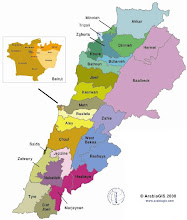 These elections don't really matter because the fundamental conflicts that brought Lebanon to a standstill since 2004 have not been addressed, according to The International Crisis Group (ICG). In fact the ICG argues that these elections because of the electoral law and the agreements made at Doha will make the likelihood of any proper national reconciliation less likely not more. "The elections will further entrench existing political elites, the system of which they are prime beneficiaries and the structural paralysis it produces."
These elections don't really matter because the fundamental conflicts that brought Lebanon to a standstill since 2004 have not been addressed, according to The International Crisis Group (ICG). In fact the ICG argues that these elections because of the electoral law and the agreements made at Doha will make the likelihood of any proper national reconciliation less likely not more. "The elections will further entrench existing political elites, the system of which they are prime beneficiaries and the structural paralysis it produces."
The ICG has just issued a report on the elections: Lebanon's Elections: Avoiding a new cycle of confrontation.
Recommendations made by the report:
To Lebanese Parties:
1. Recognize and accept the election results, while avoiding rhetorical incitement.
2. Reiterate support for the broad principle of power-sharing.
3. Relaunch, as soon as possible and under the president’s guidance, the national dialogue on strengthening
4. Task a parliamentary commission, upon formation of a new government, with immediately drafting an electoral law that includes reforms set aside in the context of the
(a) bolstering the independence and mandate of the Electoral Supervision Committee; and
(b) defining clear and practical rules governing campaign funding and propaganda.
5. Task a parliamentary commission, upon formation of a new government, with immediately drafting a law on the Constitutional Council, in particular granting the court the power to interpret the Constitution.
To both sides’ foreign allies (notably the
6. Accept and recognise the election results.
7. Avoid exacerbating divisions by, notably, encouraging a power-sharing arrangement.
8. Deal with the future government on the basis of its actual behaviour (in particular whether it respects international obligations), rather than its specific composition.
9. Engage in a mediation effort or, if needed, support one undertaken by others.
10. Take steps to improve the political system by:
(a) backing civil society reform efforts toward systemic reform;
(b) insisting on strengthenig the Constitutional Council’s role; and
(c) denouncing, publicly and clearly, abusive electoral practices, such as vote-buying and the lack of standardised ballots.




No comments:
Post a Comment